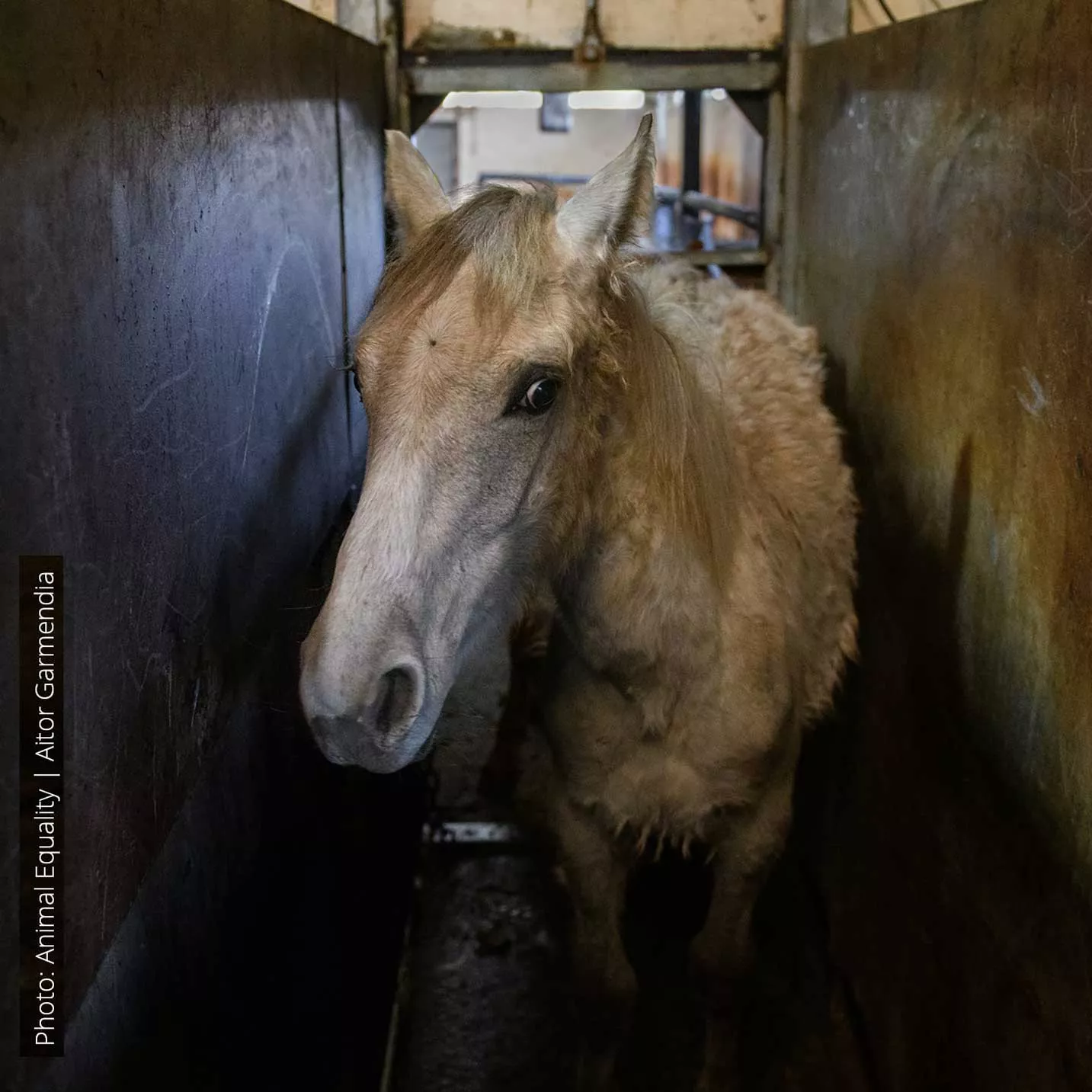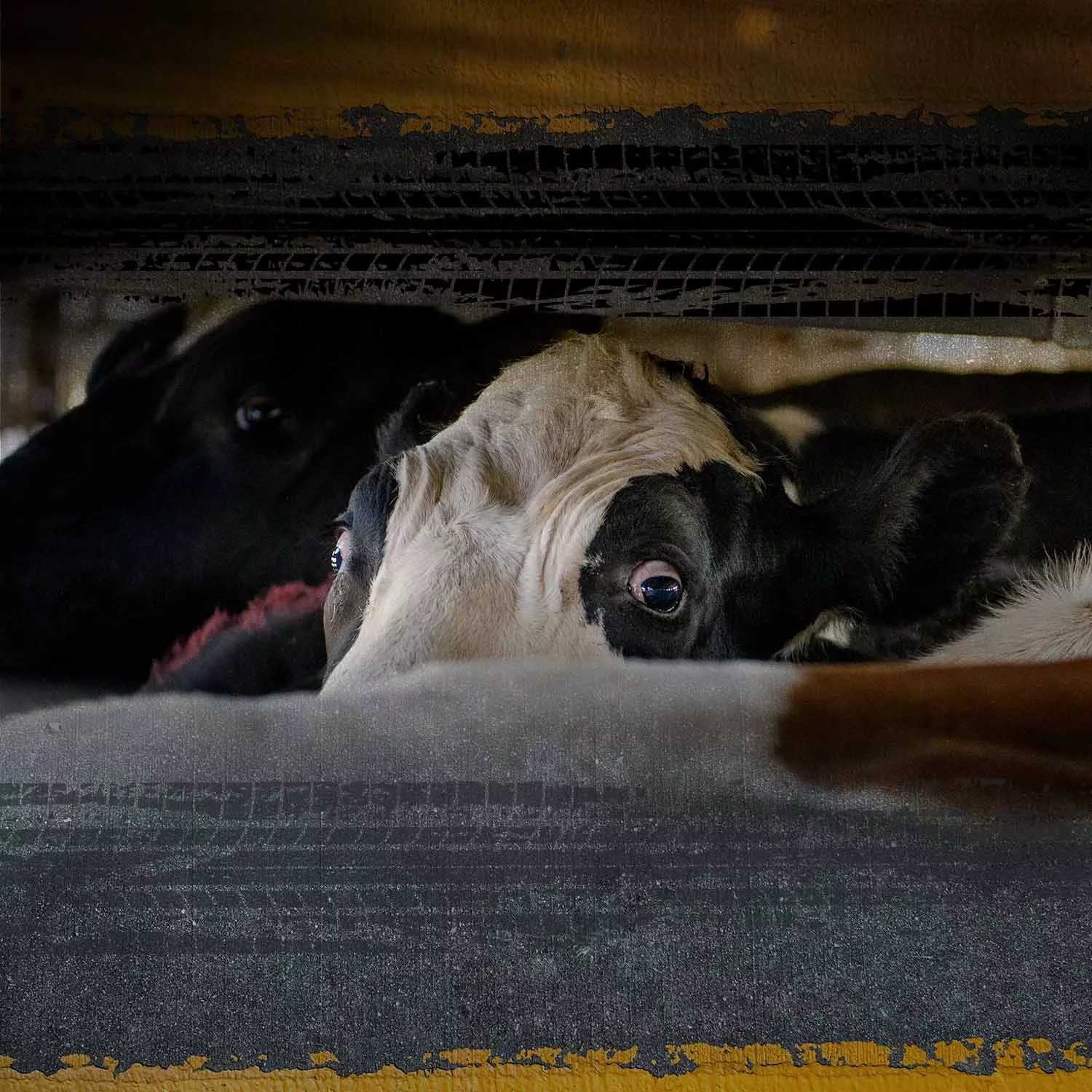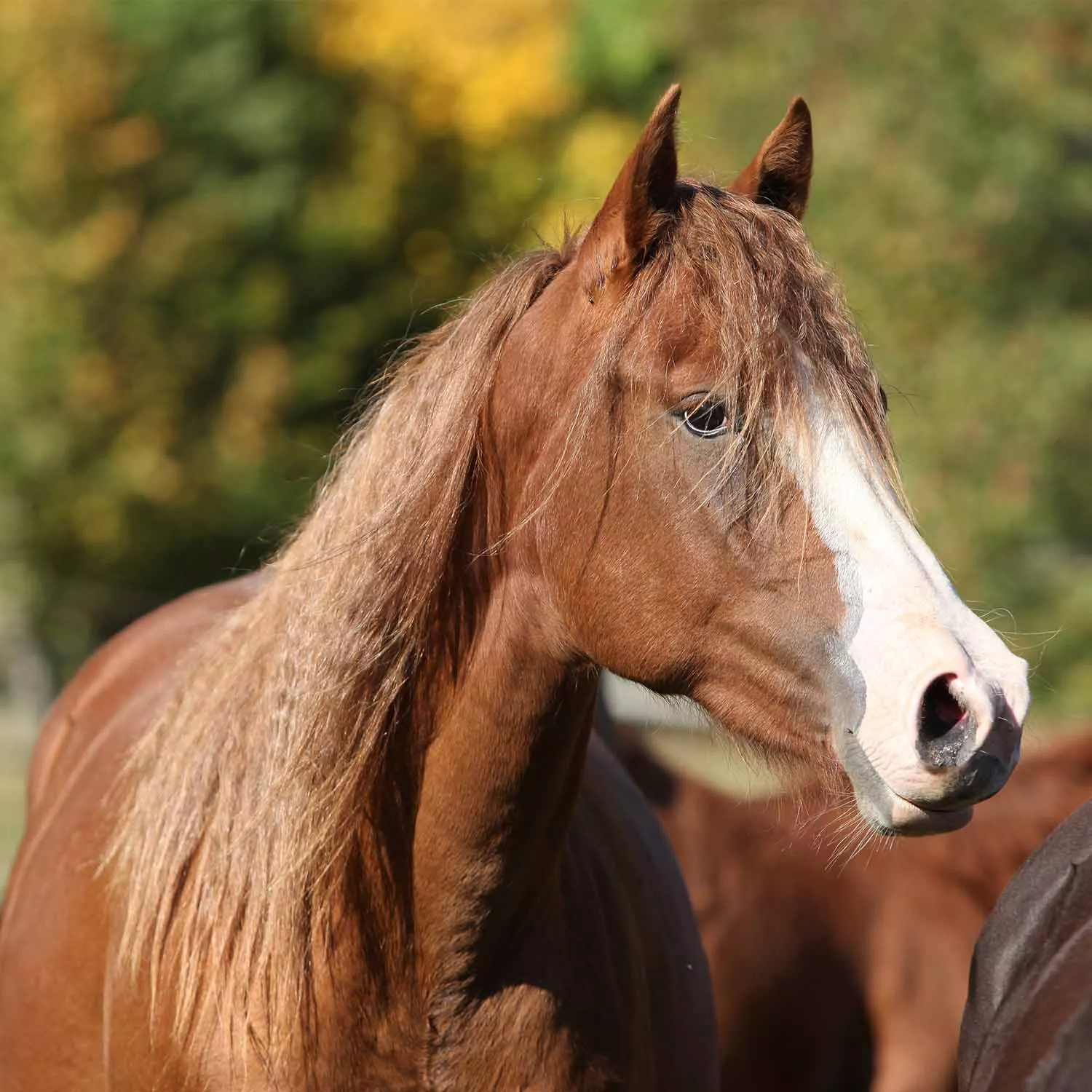HELP END HORSE SLAUGHTER
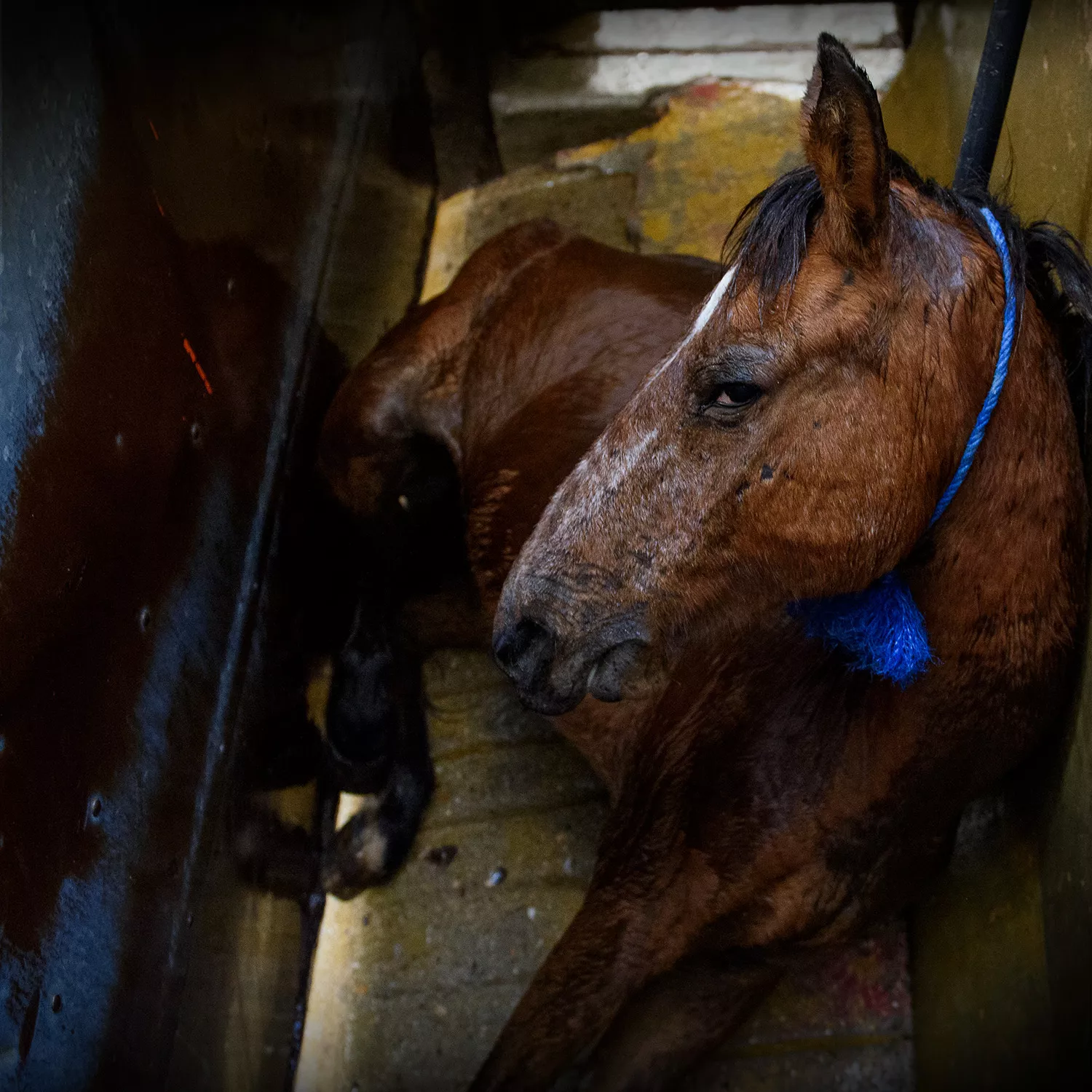
Every year, thousands of U.S. horses are transported to Canada and Mexico, and then slaughtered for human consumption. Sign the petition to help horses!
Animal Equality Investigators Film Proof of US Horses Awaiting Slaughter in Mexico
An Animal Equality investigator documented American horses awaiting their killing at a slaughterhouse in Zacatecas, Mexico. The yellow United States Department of Agriculture (USDA) stickers identify the horse’s origin. An on-site veterinarian further confirmed they’re American horses.
In the second part of this investigation, Animal Equality filmed inside a slaughterhouse in Chiapas, Mexico. The images show the cruel treatment of animals inside Mexican slaughterhouses, where American horses can also end up.
At this second slaughterhouse, investigators found severe violations of Mexican Official Standards set to avoid unnecessary suffering.
As the footage shows, workers beat, hang and spray sick and exhausted animals with water in the face to force them to move. Horses are ineffectively stunned—some are shot multiple times in the head before becoming unconscious. Animals are also slaughtered while conscious due to these ineffective stunning methods.
The US Government must protect horses from this fate and ban their transport for slaughter in other countries.
The death of horse 5036, as well as the death of tens of thousands of American horses every year, is unnecessary and unacceptable. As Animal Equality has documented with this investigation, the US is sending these horses outside of our borders so that their killing is out of sight of the majority of Americans that oppose the slaughter of horses for human consumption. Our citizens agree this suffering is wrong—now it’s time for the US Government to ban it once and for all.
Sharon Núñez, President of Animal Equality
END THE SLAUGHTER OF AMERICAN HORSES
The slaughter of horses for human consumption is a cruel practice and one that animal protection organizations have denounced for decades.
These sensitive and intelligent animals, who are considered companion animals by many, are treated as commodities in this global trade. They suffer not only in slaughterhouses but also during long-distance transport between countries.
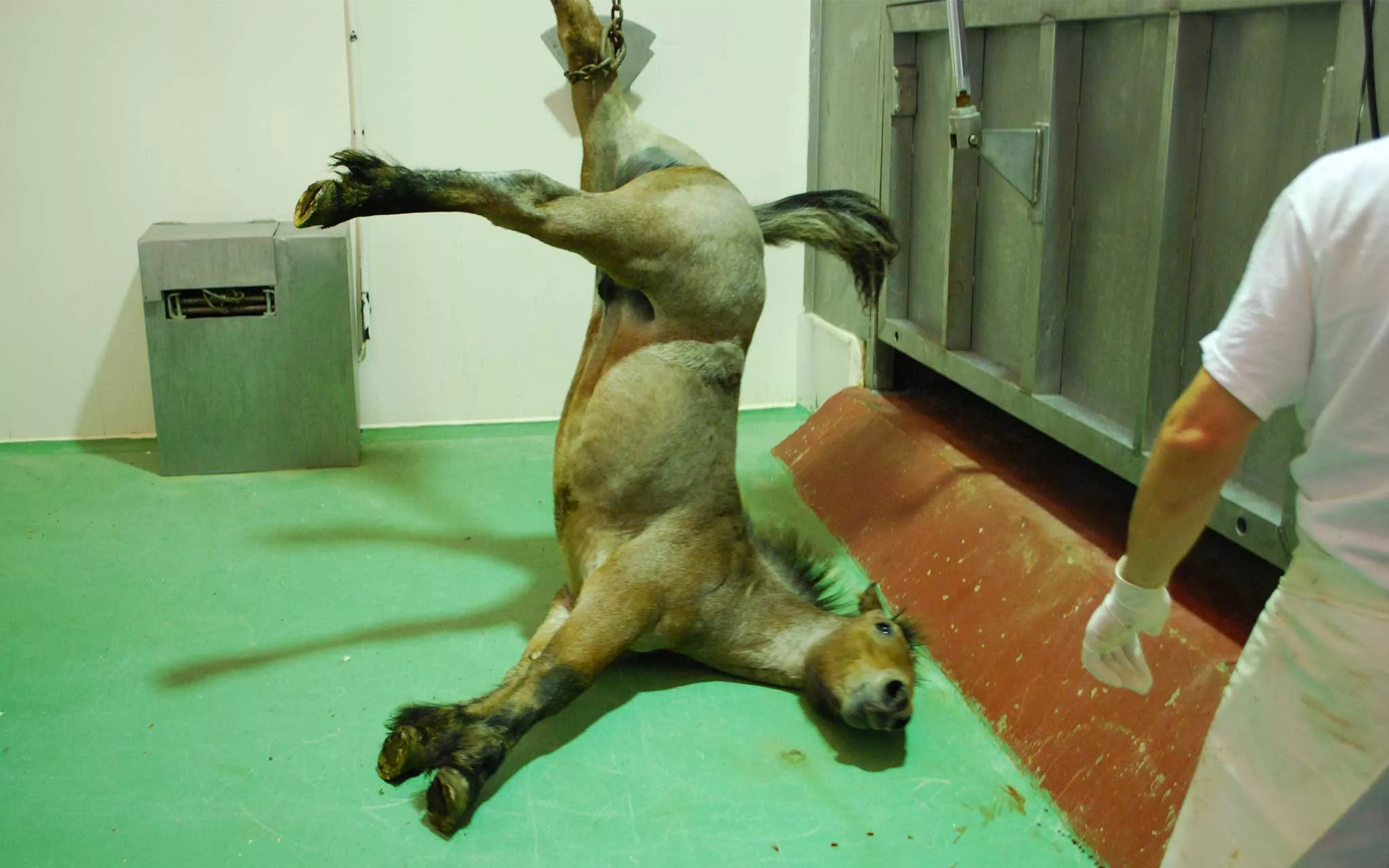
Every year around 24,000 horses are transported from the US to Mexico and Canada to be killed for their meat. Many are forced to travel in cramped conditions without food or water for more than 24 hours.
At the beginning of the day, the slaughterhouse owner told us that the horses come from farms where they are raised for meat and horse-riding schools that wanted to get rid of them for being too old, their behavior, or because they had suffered injuries that required veterinary treatment that was too expensive for them.
Carlos, undercover investigator of Animal Equality
It is time to put an end to this animal abuse.
Horse Meat in The US: FAQ
Horses are admired animals in the United States. It’s difficult to imagine these sensitive animals are killed for their meat. But many people don’t know how the US contributes to meat production from horses.
Below, we are answering your most important questions about horse slaughter.
Is Horse Slaughter Banned in the US?
There is no permanent federal ban on the slaughter or exportation of American horses.
The slaughter of horses in the US occurred as recently as 2007. The practice vanished when Congress removed funding for USDA inspectors to oversee horse slaughterhouses. Only USDA-approved meat can be commercially sold–meaning meat from horses is not currently sold for human consumption in the US.
How Does the US Contribute to Horse Slaughter?
Since the 2007 USDA deregulation, the US shifted focus to transporting horses outside the country’s borders. Approximately 24,000 horses are sent to Mexico and Canada yearly to be killed. From 2001 to 2020, the US sent over 1.6 million horses to be slaughtered by these countries.
Is Meat from Horses Sold in the US?
Though meat from horses is not sold within the US, the country ranks among the top 10 producers due to its transportation of horses outside of its borders for slaughter.
In the US it is not illegal to consume horse meat. However, horse meat cannot be sold in the US. This is because horses cannot be slaughtered for human consumption in the US, and the USDA also prohibits the importation of horse meat from other countries.
How are Horses Transported to Other Countries?
On the truck for transport, horses bound for the slaughterhouse are crammed onto trucks typically designed for smaller animals. The confined space increases the risk of injuries and no access to food or water. Naturally flight-or-flight animals, some horses begin fighting for dominance while others suffer injuries to escape kicks and bites from more aggressive horses.
Most horses suffer weight loss, fatigue, dehydration and shipping fever–a respiratory disease associated with long-distance transports.
According to a study by the United States Government Accountability (GOA) Office carried out in June 2011, horses are transported an average of 753 miles. The USDA’s Animal and Plant Health Inspection Service (APHIS) and animal protection officials have noted in the study what Animal Equality has witnessed: “Horse welfare is likely to suffer as a consequence of horses traveling significantly farther to slaughter….”
Who Eats Meat from Horses?
Over 4.3 million horses are consumed by humans around the world every year. Countries in Europe and Asia rank the highest for horse meat consumption–Italy, Belgium, France, China and Japan.
Horses are considered farmed animals, like chickens, cows, and pigs who are also exploited for their meat. But horses are more commonly acknowledged by the US public as domestic–like the dogs and cats many people live with. While 83% of US citizens oppose the slaughter of horses for their meat,1 most people don’t realize American horses are being killed in Mexico and Canada for human consumption.
1Based on a poll conducted by Lake Research Partners and The American Society for the Prevention of Cruelty to Animals (ASPCA).

EXPOSING ANIMAL ABUSE WORLDWIDE
Animal Equality is an international organization working with society, governments, and companies to end cruelty to farmed animals.
MAKE A DIFFERENCE FOR ANIMALS
Have you ever considered reducing or eliminating meat, dairy, fish, and eggs from your diet? This simple—and delicious—action can help protect animals used for meat, like horses, cows, pigs and chickens.


